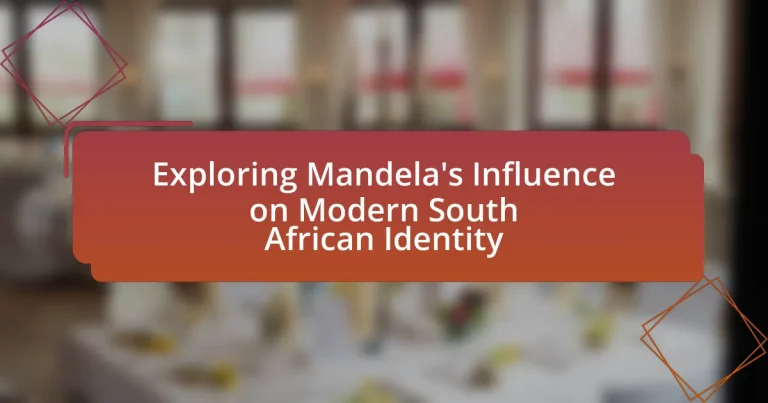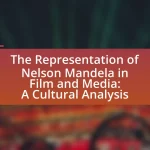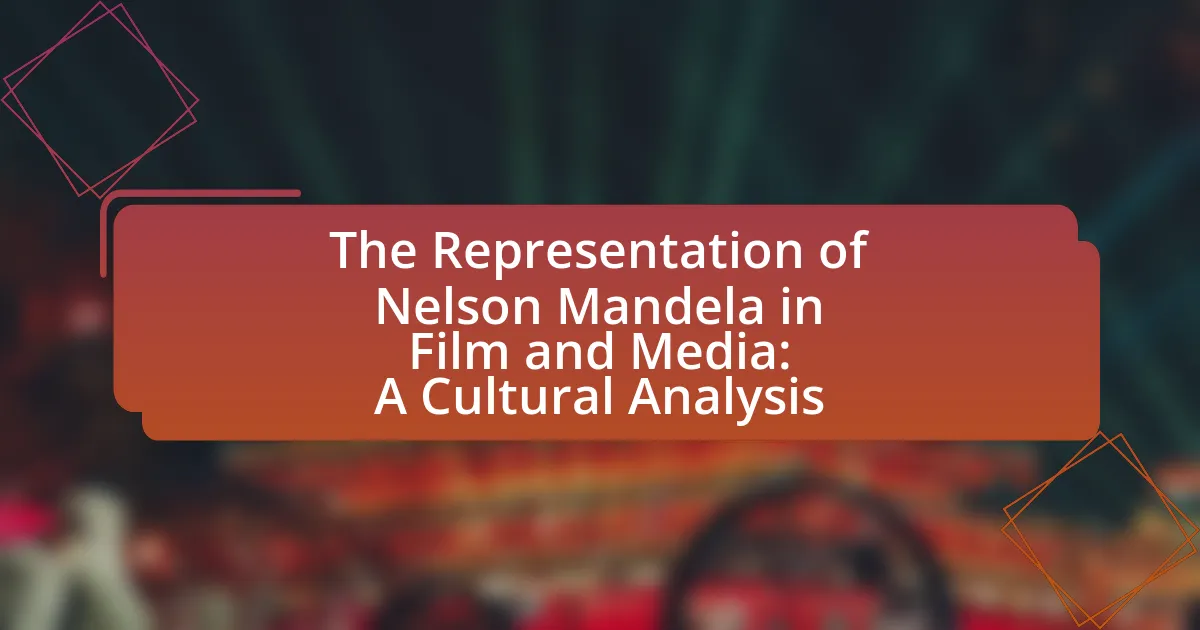Nelson Mandela is a pivotal figure in shaping modern South African identity, primarily through his promotion of reconciliation, unity, and social justice. His leadership during the anti-apartheid movement and presidency emphasized inclusivity, fostering a national identity that transcends racial divisions. Key events in his life, including his imprisonment and establishment of the Truth and Reconciliation Commission, reinforced his belief in collective identity and healing. Mandela’s legacy continues to influence contemporary South African culture, politics, and social movements, while also presenting challenges in preserving his ideals amidst ongoing inequality and political corruption.
What is Mandela’s Influence on Modern South African Identity?
Nelson Mandela significantly shaped modern South African identity by promoting reconciliation, unity, and social justice. His leadership in the anti-apartheid movement and subsequent presidency emphasized the importance of inclusivity and equality, fostering a national identity that transcends racial divisions. Mandela’s establishment of the Truth and Reconciliation Commission in 1995 aimed to address past injustices and heal the nation, reinforcing the values of forgiveness and collective progress. His global advocacy for human rights and democracy further positioned South Africa as a symbol of resilience and hope, influencing contemporary South African identity to prioritize diversity and mutual respect.
How did Mandela’s life experiences shape his views on identity?
Nelson Mandela’s life experiences profoundly shaped his views on identity by instilling a deep understanding of the interconnectedness of personal and collective identity. Growing up in the Xhosa community, Mandela was influenced by traditional values and the importance of community, which informed his belief that identity is rooted in cultural heritage. His imprisonment for 27 years further solidified his perspective, as he recognized the struggle against apartheid as a collective fight for dignity and identity among all South Africans. Mandela’s leadership in the anti-apartheid movement emphasized the significance of embracing diverse identities within a unified national identity, advocating for reconciliation and inclusivity as essential components of South Africa’s post-apartheid identity.
What key events in Mandela’s life contributed to his understanding of South African identity?
Key events in Nelson Mandela’s life that contributed to his understanding of South African identity include his early experiences in the rural village of Mvezo, his involvement in the African National Congress (ANC), and his imprisonment on Robben Island. Growing up in Mvezo, Mandela was exposed to the rich cultural heritage and traditions of the Xhosa people, which shaped his appreciation for the diverse identities within South Africa. His active participation in the ANC from the 1940s onward allowed him to engage with various political ideologies and the struggles of different racial groups, deepening his understanding of the complexities of South African identity. Furthermore, Mandela’s 27 years of imprisonment, particularly on Robben Island, provided him with a unique perspective on the resilience of the South African people and the importance of unity in the face of oppression, reinforcing his belief in a collective national identity that transcends racial divisions.
How did Mandela’s imprisonment influence his perspective on national identity?
Mandela’s imprisonment profoundly shaped his perspective on national identity by reinforcing his belief in the importance of unity among South Africans. During his 27 years in prison, Mandela reflected on the diverse cultural, ethnic, and racial backgrounds of the nation, recognizing that a cohesive national identity could only emerge through reconciliation and inclusivity. This perspective was evident in his later efforts to promote a “Rainbow Nation,” which emphasized the need for all South Africans to come together, regardless of their differences, to build a shared future. His experiences in prison highlighted the injustices of apartheid and the necessity of a collective identity that transcended divisions, ultimately influencing his leadership style and policies upon his release in 1990.
Why is Mandela considered a symbol of unity in South Africa?
Mandela is considered a symbol of unity in South Africa because he played a crucial role in ending apartheid and fostering reconciliation among diverse racial groups. His leadership during the transition from a segregated society to a democratic nation emphasized forgiveness and collaboration, exemplified by his establishment of the Truth and Reconciliation Commission in 1995, which aimed to heal the nation by addressing past injustices. Mandela’s ability to unite people across racial and cultural divides is further evidenced by his iconic 1995 Rugby World Cup appearance, where he donned the Springbok jersey, a symbol previously associated with apartheid, to promote national pride and inclusivity.
What actions did Mandela take to promote reconciliation among South Africans?
Nelson Mandela took significant actions to promote reconciliation among South Africans, primarily through the establishment of the Truth and Reconciliation Commission (TRC) in 1995. The TRC aimed to address the human rights violations that occurred during apartheid by providing a platform for victims to share their experiences and for perpetrators to confess their crimes in exchange for amnesty. This initiative was crucial in fostering dialogue and understanding between different racial groups, as it encouraged acknowledgment of past injustices and aimed to heal the nation. Additionally, Mandela emphasized forgiveness and unity in his speeches and policies, advocating for a “Rainbow Nation” where all South Africans could coexist peacefully, regardless of their backgrounds. His leadership style and commitment to non-violence further reinforced the importance of reconciliation in building a democratic South Africa.
How did Mandela’s leadership style contribute to his status as a unifying figure?
Mandela’s leadership style contributed to his status as a unifying figure through his emphasis on reconciliation, inclusivity, and forgiveness. By prioritizing dialogue over conflict, Mandela fostered a sense of national unity in post-apartheid South Africa. His decision to promote the Truth and Reconciliation Commission exemplified this approach, allowing for open discussions about past injustices while encouraging healing among diverse communities. Furthermore, Mandela’s ability to connect with people from various backgrounds, including his willingness to engage with former adversaries, reinforced his role as a bridge between divided groups. This commitment to unity was pivotal in transforming South Africa’s identity and promoting a collective vision for the future.
In what ways has Mandela’s legacy impacted contemporary South African culture?
Mandela’s legacy has profoundly impacted contemporary South African culture by promoting values of reconciliation, social justice, and human rights. His emphasis on unity and forgiveness after the apartheid era has fostered a culture of dialogue and inclusivity, evident in initiatives like the Truth and Reconciliation Commission, which aimed to heal the nation by addressing past injustices. Furthermore, Mandela’s advocacy for education and empowerment has inspired numerous programs aimed at uplifting marginalized communities, contributing to a growing emphasis on social equity in South Africa. His global stature as a symbol of resistance against oppression has also influenced contemporary South African art, literature, and music, reflecting themes of freedom and resilience.
What cultural movements have emerged in South Africa as a result of Mandela’s influence?
The cultural movements that have emerged in South Africa as a result of Nelson Mandela’s influence include the Ubuntu philosophy, the anti-apartheid arts movement, and the promotion of reconciliation and nation-building initiatives. Mandela’s emphasis on Ubuntu, which stresses communal values and interconnectedness, has inspired various social and cultural projects aimed at fostering unity among diverse communities. The anti-apartheid arts movement, which gained momentum during Mandela’s imprisonment, utilized music, literature, and visual arts to challenge oppression and celebrate freedom, significantly shaping South African cultural identity. Additionally, Mandela’s leadership in promoting reconciliation post-apartheid has led to cultural initiatives that encourage dialogue and understanding among different racial and ethnic groups, further solidifying a collective national identity.
How do modern South Africans commemorate Mandela’s contributions to their identity?
Modern South Africans commemorate Nelson Mandela’s contributions to their identity through various means, including annual celebrations, educational programs, and public memorials. For instance, Mandela Day, observed on July 18, encourages citizens to dedicate 67 minutes of their time to community service, symbolizing the 67 years he spent fighting for social justice. Additionally, schools incorporate Mandela’s teachings into their curricula, fostering a sense of national pride and unity. Public spaces, such as the Nelson Mandela Square in Johannesburg, serve as physical reminders of his legacy, where people gather to reflect on his impact. These commemorative practices reinforce Mandela’s role as a unifying figure in South Africa’s post-apartheid identity.
How does Mandela’s influence manifest in South African politics today?
Mandela’s influence manifests in South African politics today through the continued emphasis on reconciliation, social justice, and democratic values. His legacy is evident in the policies aimed at addressing inequality and promoting human rights, as seen in the post-apartheid constitution, which enshrines these principles. The African National Congress (ANC), the party Mandela led, still invokes his ideals to guide its governance, focusing on nation-building and unity. Furthermore, Mandela’s commitment to dialogue and negotiation remains a cornerstone of political discourse, influencing contemporary leaders to prioritize peaceful resolutions over conflict.
What challenges does South Africa face in preserving Mandela’s legacy?
South Africa faces significant challenges in preserving Nelson Mandela’s legacy, primarily due to political corruption, social inequality, and the commercialization of his image. Political corruption undermines the values Mandela stood for, as leaders often prioritize personal gain over public service, eroding trust in institutions. Social inequality persists, with stark disparities in wealth and access to resources, which contradicts Mandela’s vision of a united and equitable society. Additionally, the commercialization of Mandela’s image risks diluting his message, as businesses exploit his legacy for profit without honoring his principles of justice and reconciliation. These factors collectively threaten to distort and diminish the true essence of Mandela’s contributions to South Africa and the world.
How do South Africans view Mandela’s role in shaping their identity?
South Africans largely view Nelson Mandela as a pivotal figure in shaping their national identity, symbolizing unity, resilience, and the struggle for freedom. His leadership in the anti-apartheid movement and subsequent presidency from 1994 to 1999 fostered a sense of national pride and collective identity among diverse racial and cultural groups. Mandela’s emphasis on reconciliation and nation-building helped to heal the deep divisions created by apartheid, as evidenced by the establishment of the Truth and Reconciliation Commission, which aimed to address past injustices. His legacy is celebrated annually on Mandela Day, reflecting the widespread recognition of his contributions to South Africa’s democratic identity and social cohesion.
What are the differing perspectives on Mandela’s impact among various demographics?
Nelson Mandela’s impact is perceived differently across various demographics in South Africa. Black South Africans often view Mandela as a heroic figure who played a crucial role in dismantling apartheid and promoting racial reconciliation, as evidenced by his leadership in the African National Congress and his presidency from 1994 to 1999, which marked the first democratic elections in the country. Conversely, some white South Africans may regard Mandela’s legacy with ambivalence, focusing on the economic challenges and social unrest that followed the end of apartheid, which they attribute to policies implemented during his administration. Additionally, younger generations, regardless of race, may have a more nuanced view, recognizing Mandela’s contributions while also critiquing the ongoing socio-economic disparities that persist in post-apartheid South Africa. This divergence in perspectives highlights the complex and multifaceted nature of Mandela’s legacy across different segments of the population.
How do younger generations perceive Mandela compared to older generations?
Younger generations perceive Nelson Mandela as a symbol of hope and inspiration, while older generations view him as a pivotal leader in the struggle against apartheid. This difference in perception stems from the younger generation’s focus on Mandela’s legacy of reconciliation and nation-building, contrasting with the older generation’s lived experiences of his leadership during the anti-apartheid movement. Research indicates that younger South Africans often emphasize Mandela’s global impact and his role in promoting democracy, whereas older individuals tend to reflect on the sacrifices made during the struggle for freedom, highlighting his direct involvement in political activism and negotiations.
What role does race play in shaping views on Mandela’s legacy?
Race significantly influences views on Mandela’s legacy, as it shapes perceptions of his role in the anti-apartheid struggle and the subsequent nation-building efforts in South Africa. For many Black South Africans, Mandela is celebrated as a symbol of liberation and hope, representing the triumph over systemic racial oppression. Conversely, some white South Africans may view Mandela’s legacy through a lens of loss or nostalgia for the apartheid era, leading to a more critical perspective on his policies and their impact on the socio-economic landscape. This divergence in views is supported by surveys indicating that racial identity correlates with differing opinions on issues such as land reform and economic redistribution, which are central to Mandela’s vision of equality.
How has Mandela’s influence affected South Africa’s international image?
Mandela’s influence has significantly enhanced South Africa’s international image by positioning the country as a symbol of reconciliation and democracy. His leadership in the anti-apartheid movement and subsequent presidency from 1994 to 1999 showcased a commitment to peace and unity, which garnered global admiration. For instance, Mandela’s efforts in promoting the Truth and Reconciliation Commission demonstrated a unique approach to healing a divided nation, earning South Africa recognition as a model for conflict resolution. Additionally, Mandela’s advocacy for human rights and social justice resonated worldwide, leading to increased diplomatic relations and foreign investment, which further solidified South Africa’s standing on the global stage.
What role did Mandela play in promoting South Africa on the global stage?
Nelson Mandela played a crucial role in promoting South Africa on the global stage by advocating for human rights and reconciliation after the end of apartheid. His leadership during the transition to democracy in the 1990s garnered international support and attention, positioning South Africa as a symbol of peaceful conflict resolution. Mandela’s participation in global forums, such as the United Nations, and his efforts to foster diplomatic relations with other nations helped to elevate South Africa’s status internationally. His commitment to social justice and equality resonated worldwide, leading to increased foreign investment and tourism, which significantly contributed to the country’s economic growth.
How do international perceptions of Mandela influence South African identity?
International perceptions of Nelson Mandela significantly shape South African identity by fostering a sense of national pride and unity. Mandela is globally recognized as a symbol of resistance against apartheid and a champion of human rights, which enhances South Africa’s image on the world stage. His legacy encourages South Africans to embrace values of reconciliation and equality, as evidenced by the widespread celebration of his birthday as Mandela Day, promoting community service and social justice. Furthermore, international admiration for Mandela reinforces a collective identity among South Africans, as they view themselves as part of a nation that overcame oppression through peaceful means, thus influencing their social and political narratives.
What lessons can be learned from Mandela’s influence on identity formation?
Mandela’s influence on identity formation teaches the importance of resilience, inclusivity, and the power of forgiveness. His life exemplified how overcoming adversity can shape a collective identity, as seen in his role in dismantling apartheid and promoting reconciliation in South Africa. Mandela’s emphasis on unity among diverse ethnic groups highlighted the necessity of embracing multiple identities to foster social cohesion. His ability to forgive former oppressors demonstrated that personal and national healing can lead to a stronger, more unified identity. These lessons underscore the significance of leadership in shaping identities that prioritize collective well-being over division.
How can Mandela’s approach to leadership inform current and future leaders in South Africa?
Mandela’s approach to leadership can inform current and future leaders in South Africa by emphasizing reconciliation, inclusivity, and moral integrity. His leadership during the transition from apartheid to democracy showcased the importance of uniting a divided nation through dialogue and forgiveness, as seen in the establishment of the Truth and Reconciliation Commission in 1995, which aimed to heal the wounds of the past. Furthermore, Mandela’s commitment to social justice and equality serves as a guiding principle for leaders to prioritize the needs of all citizens, fostering a sense of belonging and community. His ability to inspire hope and resilience in the face of adversity illustrates the power of visionary leadership, encouraging contemporary leaders to adopt a long-term perspective focused on nation-building and collective progress.
What strategies did Mandela use to foster inclusivity and unity?
Nelson Mandela employed several strategies to foster inclusivity and unity in South Africa, primarily through reconciliation, dialogue, and nation-building initiatives. He emphasized the importance of forgiveness and understanding between different racial and ethnic groups, famously promoting the idea of a “Rainbow Nation” to symbolize unity in diversity. Mandela’s establishment of the Truth and Reconciliation Commission in 1995 served as a platform for addressing past injustices and fostering healing, allowing victims and perpetrators to share their stories and seek closure. Additionally, he encouraged the participation of all South Africans in the democratic process, advocating for equal rights and representation, which helped to build a sense of belonging among previously marginalized communities. These strategies were instrumental in transforming South Africa from a divided society into a more inclusive nation.
How can these strategies be applied to address current societal challenges?
Strategies inspired by Nelson Mandela can be applied to address current societal challenges by promoting reconciliation, inclusivity, and social justice. For instance, Mandela’s emphasis on dialogue and understanding among diverse groups can help mitigate racial tensions in South Africa today, as evidenced by initiatives like the Truth and Reconciliation Commission, which aimed to heal the nation post-apartheid. Additionally, Mandela’s advocacy for education as a tool for empowerment can be leveraged to tackle issues such as poverty and inequality, as education remains a critical factor in improving socio-economic conditions. According to the World Bank, investing in education can yield significant returns, reducing poverty rates and fostering economic growth. Thus, applying Mandela’s strategies can effectively address contemporary societal issues by fostering unity and promoting equitable opportunities.
What practical steps can individuals take to honor Mandela’s legacy in their communities?
Individuals can honor Mandela’s legacy in their communities by actively promoting social justice and equality. Engaging in community service initiatives, such as organizing food drives or educational programs, reflects Mandela’s commitment to uplifting marginalized groups. Additionally, individuals can participate in discussions and workshops that focus on human rights, fostering an environment of understanding and respect. Supporting local businesses and advocating for fair labor practices also aligns with Mandela’s vision of economic empowerment. These actions not only pay tribute to his legacy but also contribute to building a more equitable society, echoing Mandela’s lifelong dedication to fighting injustice and inequality.




